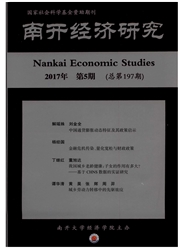

 中文摘要:
中文摘要:
近年来,“二代”现象愈演愈烈表明了我国社会各阶层日趋固化。刻画这种社会固化的重要工具就是代际收入传递。已有大量文献估计了我国的代际收入流动性,但以往研究并没有分析父辈收入是通过何种途径作用于子辈收入,因而也就难以提供有针对性的政策建议。本文利用2008年的天津市城镇住户调查数据,对代际收入弹性进行了分解,以分析父辈收入对子辈收入的传导途径。在研究方法上,本文修正了Blanden等(2007)的错误,进而发展出了新的分解方法,并利用新方法对代际收入弹性进行了分解。分解结果表明,教育是父辈收入作用于子辈收入的主要传导途径。父辈收入也可通过影响子女的所有制、行业和职业等就业特征进而作用于子辈收入,但就业特征这一传导途径的作用幅度要远低于教育。此外,相当大一部分的代际收入弹性无法由教育与就业特征等传导途径得到解释,父母的能力遗传与社会关系等不可观测因素对子女收入的作用不容忽视。
 英文摘要:
英文摘要:
Recently, the "second generation" phenomenon shows that the social strata increas- ingly solidified reality. The intergenerational income transmission is an important tool to charac- terize this social curing. The intergenerational income mobility has been estimated in China, but the recent research did not analyze how the income transmitted from parents to their children. So there are no appropriate policies to increase the intergenerational income mobility. Based on the data of urban household survey in Tianjin in 2008, we decompose the income elasticity of inter- generational income, and analyze the transmission ways of income of parents. We correct the mistakes of Blanden et al. (2007), and develop a new decomposition method. Using the new method, we decompose the intergenerational income elasticity. The decomposition results show that education is the main way to transfer the income from parents to their children. Parents can also affect their children's income by the ownership, industry and employment characteristics of their children's job, but all of the influence is much lower than education. In addition, a large part of the intergenerational income elasticity can't be explained by the education and employ- ment characteristics, so then unobservable factors on the income of children such as the ability of parents to genetic and social relations can't be ignored.
 同期刊论文项目
同期刊论文项目
 同项目期刊论文
同项目期刊论文
 期刊信息
期刊信息
